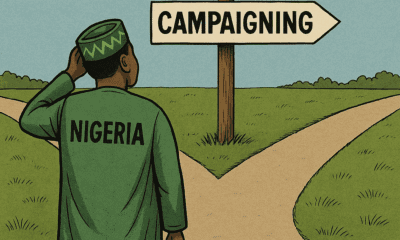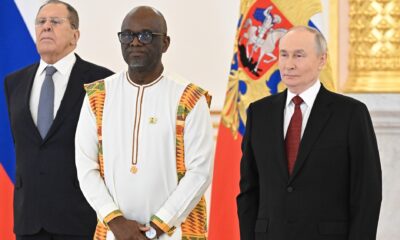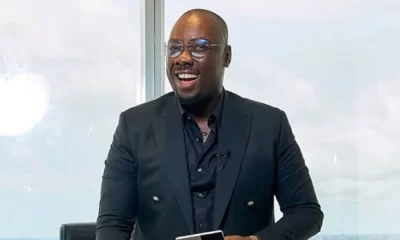Breaking News
ADC can unseat Tinubu in 2027 — Dagogo
He also gives insight into why he took President Bola Tinubu and others to court over the suspension of the executive and legislature in Rivers State, as well as the consequences of the suit on the reported reconciliation between Governor Sim Fubara and FCT Minister Nyesom Wike. He equally speaks on the National Assembly, suggests ways the crisis-ridden PDP can rise again, and many more.

In this interview with, Dr Farah Dagogo, a former House of Representatives member and Rivers State governorship aspirant, says the opposition African Democratic Congress (ADC) coalition can dislodge the ruling All Progressives Congress (APC) and bring succour to Nigerians in 2027, if internal democracy and unity are prioritised.
He also gives insight into why he took President Bola Tinubu and others to court over the suspension of the executive and legislature in Rivers State, as well as the consequences of the suit on the reported reconciliation between Governor Sim Fubara and FCT Minister Nyesom Wike. He equally speaks on the National Assembly, suggests ways the crisis-ridden PDP can rise again, and many more.
As someone close to Atiku Abubakar, what role do you see him playing in helping to strengthen the ADC coalition?
Nigeria’s political landscape is evolving, and there is a renewed urgency to provide Nigerians with a credible, values-driven alternative to the current administration. Former Vice President Atiku Abubakar’s involvement in efforts to realign progressive forces and reposition the ADC (African Democratic Congress) is a testament to his enduring commitment to democratic governance and inclusive development.
The coalition movement is not merely about winning elections, it is about rebuilding national unity, restoring economic stability, and reforming governance. Atiku’s wealth of experience and strategic insight are crucial assets in this endeavour. The challenges before Nigeria are numerous, but they are not insurmountable. What is needed is principled leadership, institutional integrity, and a shared national vision. I remain committed to these ideals and will continue to contribute to the cause of justice, good governance, and democratic renewal.
Could the presidential ambitions of Atiku, Obi, and Amaechi cause problems for the ADC coalition?
The expressions of interest by credible figures such as Mr. Peter Obi and Rt. Hon. Chibuike Amaechi, alongside the perceived interest of H.E. Atiku Abubakar, reflects the growing appeal of the coalition platform. While competition is healthy, the outcome of the primaries must be transparent, democratic, and anchored on merit and national acceptability.The mistake of 2023 must not repeat itself. Post-primary reconciliation mechanisms should be instituted to unify all aspirants, regardless of the outcome, ensuring that the party emerges stronger and more cohesive.
How would you describe the current state of Nigeria under President Tinubu’s leadership?
The administration’s policy trajectory has been marked by uncertainty and public discontent. The removal of fuel subsidies, though economically justifiable in theory, was implemented without a robust social safety net, thereby inflicting avoidable hardship on citizens. Healthcare remains underfunded, education continues to suffer from systemic neglect, and insecurity persists despite military efforts. The economy is grappling with inflation never witnessed in our chequered history, a weakened naira, and high unemployment. Structural reforms are necessary, but they must be humane, inclusive, and data driven. Leadership must be empathetic, and governance must be evidence based.
What do you think are the major problems facing the PDP, and how can the party rebuild?
The People’s Democratic Party (PDP) has yet to fully address internal divisions, ideological disorientation, and a loss of public trust. The inability to enforce party discipline, ensure transparent primaries, especially at the state levels, and project a cohesive national vision cost the party dearly in 2023.
Rebuilding must begin with a return to the party’s founding principles: justice, equity, and service. Leaders such as Atiku Abubakar must play a pivotal role in mentoring the next generation, fostering unity, and driving issue-based engagement. PDP must become a responsive, reform-oriented institution that puts people first.
Do you believe the ADC coalition can defeat the APC in 2027, like APC defeated the PDP in 2015?
Yes, I believe the coalition being forged within the ADC framework holds significant potential if built on genuine national interest and clear ideological grounding to replicate or even surpass what happened in 2015. The key will lie in cohesion, credibility, and commitment to democratic values.
If anything, 2015 taught us that a united front, anchored on a shared vision for good governance and strong leadership, can change the tide of national politics. However, unlike 2015, where the transition was driven largely by political expediency, this coalition must be defined by substance, people centered policy, and integrity of purpose.
If these elements remain central, and internal democracy is upheld, the ADC-led coalition has every chance to become a formidable alternative capable of redefining Nigeria’s political landscape.
What’s your view on the suspension of elected officials in Rivers State, especially in light of the Vice President’s recent comments?
The events of March 18, 2025, as it relate to Rivers State, remain a stark violation of Nigeria’s constitutional democracy. The unilateral suspension of a sitting Governor, his Deputy, and members of the Rivers State House of Assembly by Mr. President without recourse to due process or constitutional provisions set a dangerous precedent. My position has always been clear: the sanctity of the ballot and the sovereignty of the people must be respected.
The Vice President’s recent public acknowledgment of the unconstitutionality of the action validates the concerns I raised in court. It is a welcome development, albeit a belated one. What remains is for the Presidency to do the honourable thing by reversing this affront to democracy and ensuring that democratic institutions are not undermined for political expediency.
Nigeria’s democratic journey remains work in progress. My resolve, shaped by personal trials and a deep-rooted love for the nation, is to continue advocating for justice, responsible governance, and participatory democracy. Together, with like-minded patriots, we can build a nation that works for all.
How does the reconciliation between Governor Fubara and Minister Wike affect your ongoing court case?
Reconciliation between political actors is always welcome, particularly in a democracy where dialogue and compromise are pillars of governance. However, personal reconciliation does not override the need for legal accountability.
The matter in court is not about individual differences between Governor Fubara and Minister Wike; it is about the legality and constitutionality of the President’s action in suspending a duly elected government. That question remains unanswered and must be judicially resolved to protect our democratic framework for present and future generations. Therefore, the court case will continue until a determination is made on the merit.
After your disqualification in the 2023 Rivers governorship race, should Nigerians expect you to run for office again?
The events leading up to the 2023 elections were deeply unfortunate and symptomatic of a broader democratic decay. My arrest, on the false allegation of cultism, an accusation now thoroughly discredited and dismissed by the courts was a politically motivated attempt to silence dissent and truncate my legitimate aspirations.
However, I remain undeterred. Public service is not a sprint but a marathon. My political ambition has never been driven by desperation but by a sincere desire to serve and effect transformative change. I have continued to consult widely and reflect deeply on the path forward.
In due course, I will make a formal declaration on the next steps. What I can assure you is that my commitment to Rivers State and Nigeria remains unwavering, and I will be on the ballot when the time is right with the mandate to restore dignity, prosperity, and inclusive development to our people.
Do you think the current National Assembly is doing enough to hold the Executive accountable?
The essence of a functional democracy is the principle of separation of powers, where the legislature plays a critical role in checking the excesses of the executive. Unfortunately, what we have witnessed thus far in this dispensation is a National Assembly that often appears acquiescent, lacking the assertiveness and independence expected of a co-equal arm of government.
While there are a few legislators who have shown courage and fidelity to constitutionalism, the broader performance of the Assembly raises questions about its commitment to oversight, accountability, and the defense of democratic norms. The ratification of the unconstitutional suspension of elected officials in Rivers State is a glaring example of legislative abdication.
Moving forward, the National Assembly must reclaim its constitutional mandate by asserting its independence, upholding the rule of law, and ensuring that executive actions are guided by legality, transparency, and the best interests of the Nigerian people.










